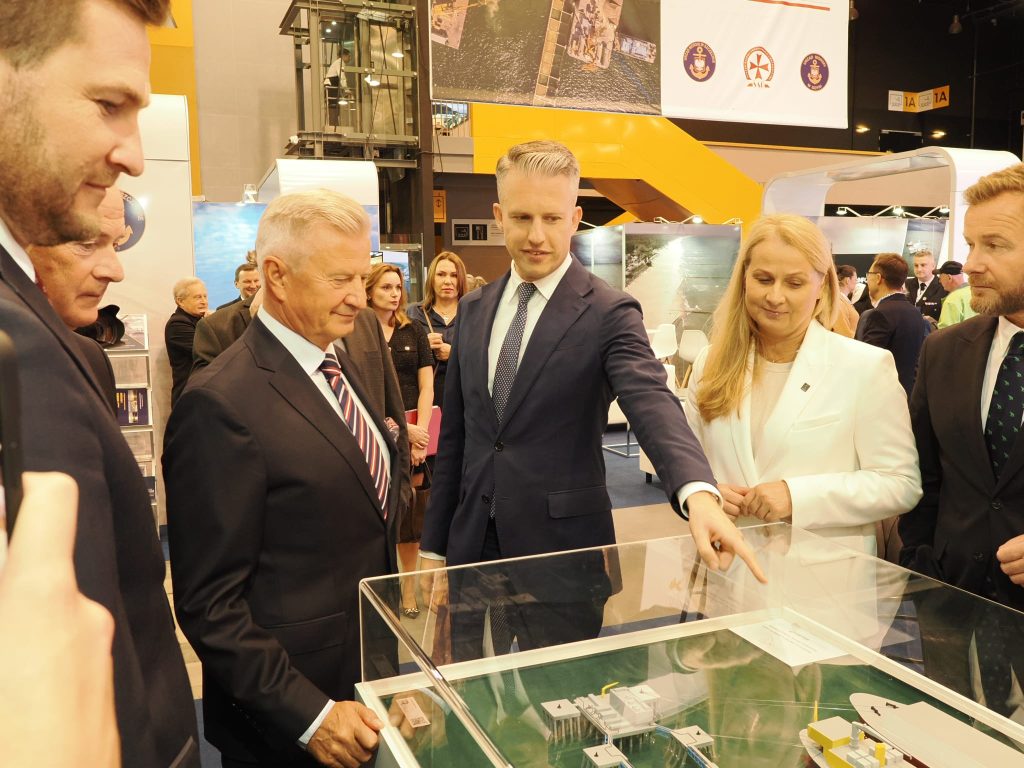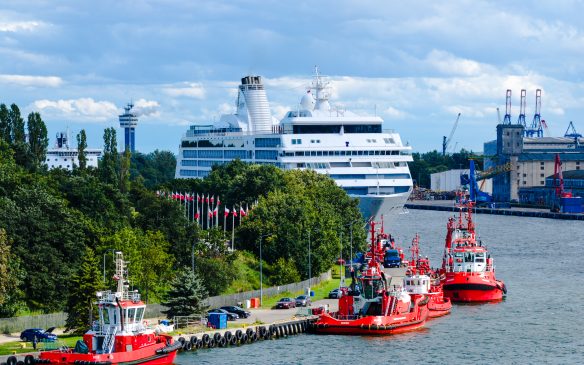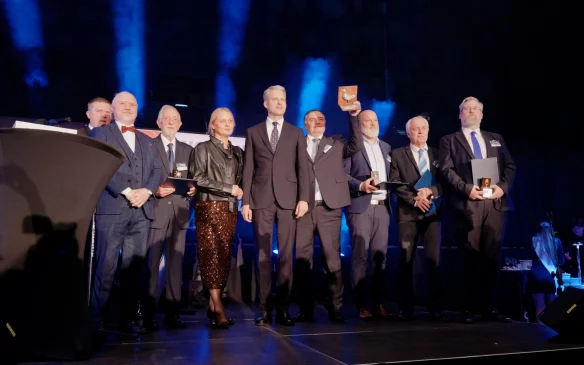EU’s maritime industrial strategy: sea ports are crucial

The 2025 BALTEXPO International Maritime and Military Fair has ended. The event featured 300 exhibitors from the port, military shipbuilding and offshore industries from 23 countries. Yet Baltexpo is not just a fair. It is also a forum for merit-based discussions about the future of the European maritime economy. The Port of Gdańsk was a Strategic Partner of this year’s Baltexpo.
Those attending the opening ceremony of the fair included the Deputy Minister of Infrastructure, Arkadiusz Marchewka, the Deputy Minister of Defence, Stanisław Wziątek, the representatives of Polish central and local authorities, as well as members of the diplomatic corps of the Baltic states.
Deputy Minister Arkadiusz Marchewka stressed the crucial importance of Polish sea ports to national security:
‘This government has chosen a single course with a resolve. It is a course for growth. Today, this growth means more than before. The growth of the maritime economy is followed by a general improvement in security of the entire country. The ‘great water’ is our opportunity to improve the security of the economy, energy, defence, and food sectors, which we will seize even better than before.’
In 2024, a record 3.3 million TEUs were handled in Polish sea ports, with their net profits peaking above 550 MPLN. The central budget revenue from taxes, excise and custom duties were around 56 BPLN. These figures prove that the maritime economy is becoming an increasingly strong foundation for the overall Polish economy and national security.
Sea ports must evolve
Challenged by changing global supply chains and increasing threats to sensitive infrastructure, along with the growing importance of dual-use resources, the European Union wishes to rebuild the power of its maritime industry. This is the objective of EU’s maritime industrial strategy. This means sea ports have a crucial part to play. Recent years have shown the importance of uninterrupted supply chains, timely deliveries, and the sourcing of energy raw materials, components, and consumer goods. The assurance of streamlined and secure sea trading operations is key to the European industry. The same applies to the defence sector, currently the flywheel of many national economies, including Poland’s. Critical infrastructure has been becoming an increasingly important dual-use resource due to its civilian and defence significance and capabilities.
In a panel on the EU’s maritime industrial strategy, Dorota Pyć, President of the Port of Gdańsk, mentioned the challenges and directions in the sector.
‘The European maritime manufacturing and shipping cluster today operates in an environment of increasing global competition that has been culminating in real security threats. The remedy for this challenge is to be a tangible action for reindustrialisation. The last ten years have shown how difficult the European reindustrialisation efforts have been after several decades of growth without proper procedures or tools for economic security, negatively affecting the welfare of EU citizens. Therefore, the improved competitiveness of the marine economy, shipping, and sea ports is simply a must-have along with continued support for the green and digital transformation of the maritime industry. In the EU, we have been using programs, strategies and plans for decades to promote and direct growth in many areas. There is work happening in the EU maritime industrial and sea port strategies, which demonstrates a firm trend to organise the EU’s sea domain or dimension, although it has now entered an era of turbulence’, said Dorota Pyć.
The Port of Gdańsk is a key logistics hub where global trade and military mobility routes intersect. The port is seeking to develop as an energy transport hub to support a shift towards a safer and more sustainable Europe.
‘To successfully reinforce the economy, resilience, and strategic autonomy of the EU, all our sea ports must evolve and respond to the future needs for clean energy, the growth of industrial clusters, and dual-use resources’, said Dorota Pyć. ‘It is very important to simplify the legislative procedures and unlock fast-track permits and concessions for projects that will improve and expand the resilience of the Port of Gdańsk. The legislative environment should be made simpler and more in tune with reality’.
When putting their money into sea ports, domestic and foreign operators would like to profit from their investments for the decades ahead, which means for more than 50 years.
‘Some market players in the European Union can do this, but we have our hands tied by the Polish Civil Code written in 1965, which caps the lease of land to 30 years’, said Dorota Pyć.
The tragedy of war and the power of cooperation
The reality of war experienced by the workers of Ukrainian sea ports, people who have stayed on the job with incredible courage and determination, despite the daily explosions, missile attacks, and destruction of sea infrastructure, was a topic during the fair at the Round Table, held for sea institutions from Poland and Ukraine.
The Round Table debate was attended by representatives of the Ukrainian Sea Port Authority, the Maritime Office in Gdynia, sea ports of strategic importance to the Polish Economy, and the Polish charge d’affaires for Ukraine, Roman Szepeliak.
The discussions concerned the issue of maritime security at war, the prospective post-war rebuilding of the sea port infrastructure, the European dialogue for integrating Ukraine’s shipping lanes with the continent, digital transformation and drone countermeasures for sea ports, and the implementation of low-emission, pro-green solutions in the maritime sector.
At the end of the Round Table, the participants watched the moving film “Working towards victory” which described the incredible perseverance of the people of the sea, who strive for victory despite the ongoing war.
The Round Table was not only a forum for exchanging experiences, but also a symbol of solidarity and bridging the gaps between Polish and Ukrainian partners in these trying times.
A place where the future unfolds
An equally important event at this year’s Baltexpo was the Education, Careers and Jobs Day, a meeting space for representatives of the maritime industry and those looking for new professional challenges.
The participants had the opportunity to talk with the leading maritime businesses, explore the recruitment offers and understand the daily work in the dynamically growing maritime and sea port industries.
It has been increasingly attractive to switch careers and pursue jobs in the maritime sector. Poland stands at the doorstep of building a thriving offshore sector that will create several thousand jobs in the coming decade. Sea ports are investing in digital transformations and the automation of processes, unlocking great opportunities for IT professionals, engineers, automation designers and logistic specialists.
The maritime industry is a fusion of stability with modernity – it is a sector of the future in which one can build a career.
A hugely popular feature at Baltexpo was the presentation “The Port of Gdańsk: A Place Where The Future Unfolds”, led by Natalia Lewandowska, HR Director at the Port of Gdańsk.
During her keynote address, she talked about career paths, development opportunities in the infrastructure, security, digital transformation, environmental protection, and international cooperation. Her presentation was an inspiration to those seeking to contribute to building the future of one of the largest and fastest growing sea ports in Europe.
Baltexpo also featured a discussion panel on the role of public and private capital in the development of sea ports; one of the panellists was Stefan Rudnik, Investment Division Director at the Port of Gdańsk. The panel experts discussed the challenges and directions of the Polish sea port sector against the backdrop of global changes in geopolitics, globalisation, energy transition and climate.
The 2025 BALTEXPO proved that the Polish maritime industry is a domain brimming with innovation, collaboration and professional opportunities. It is something that is worth being a part of today and the future.



